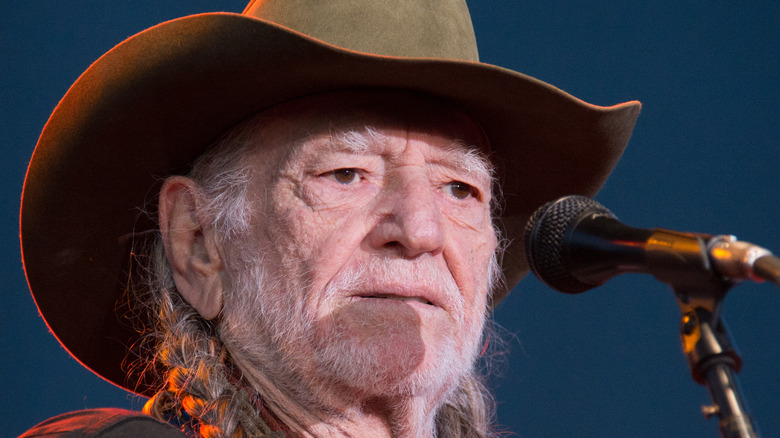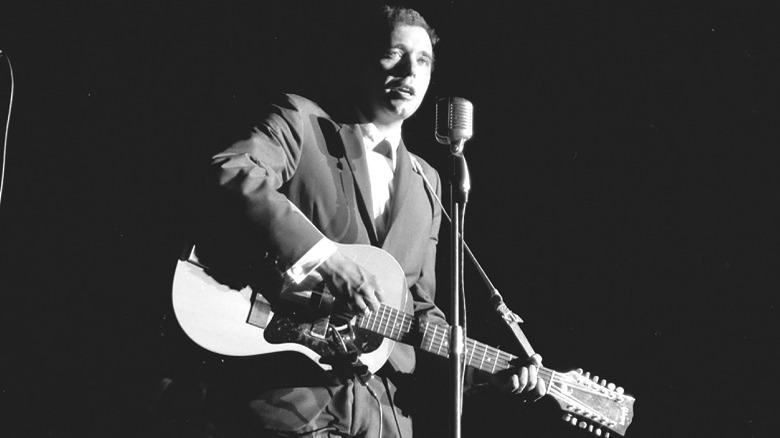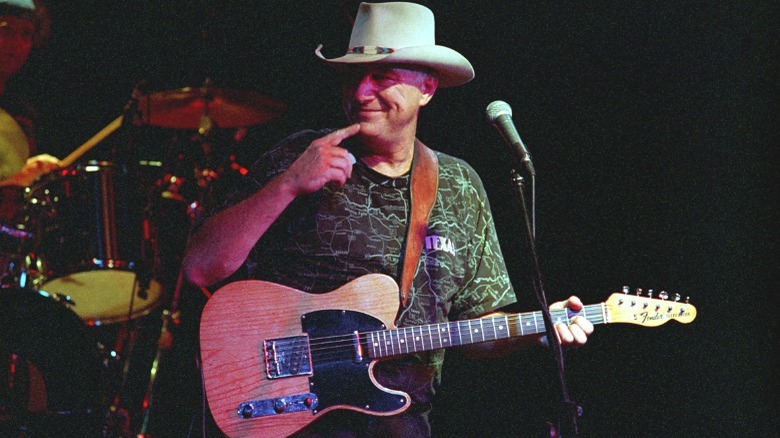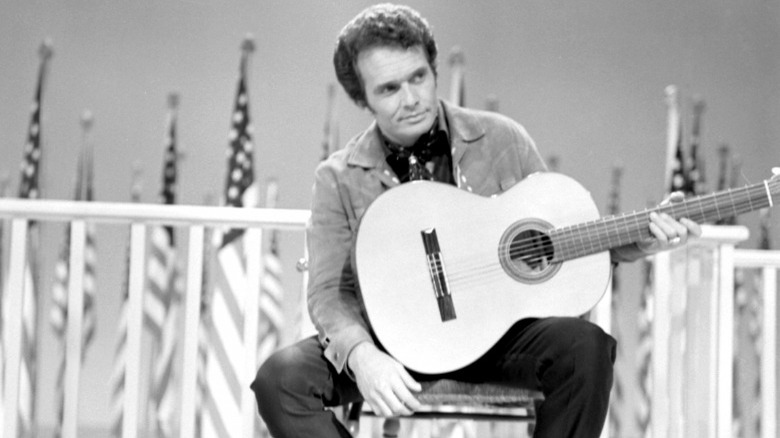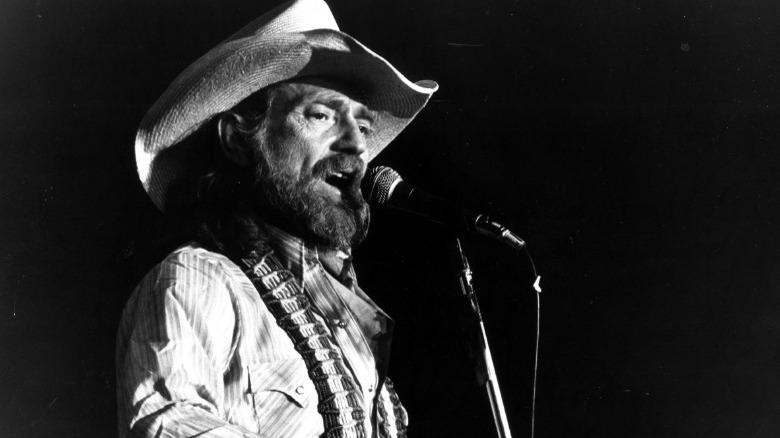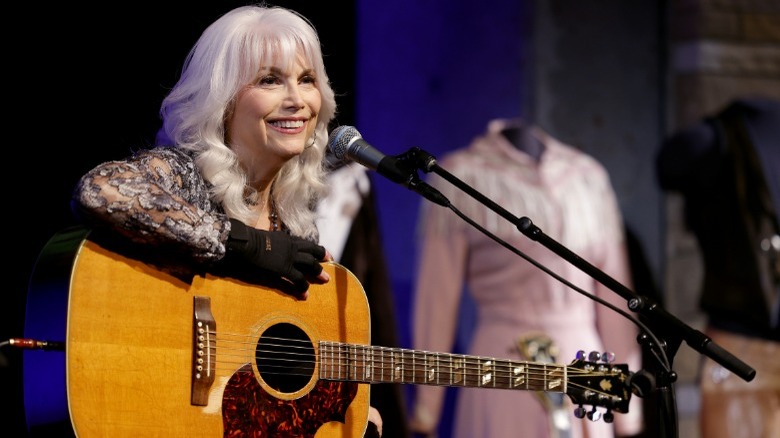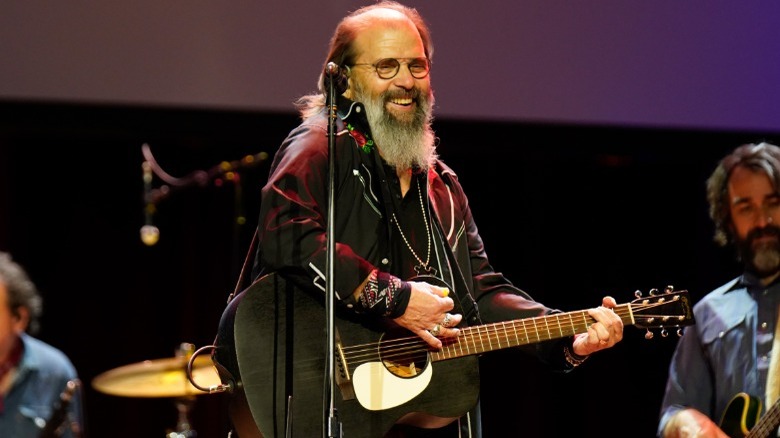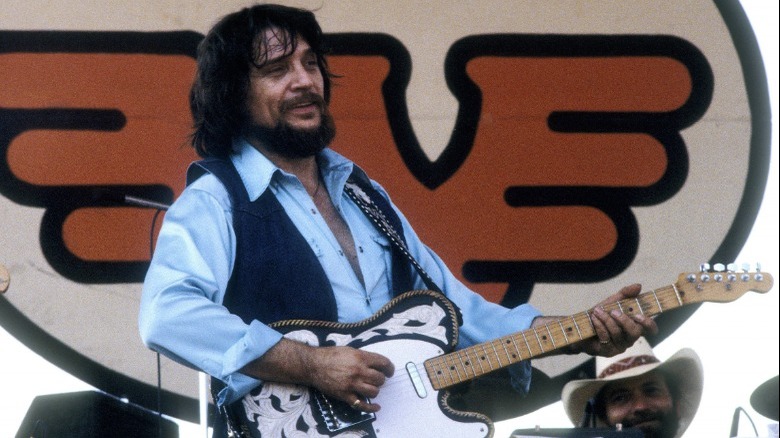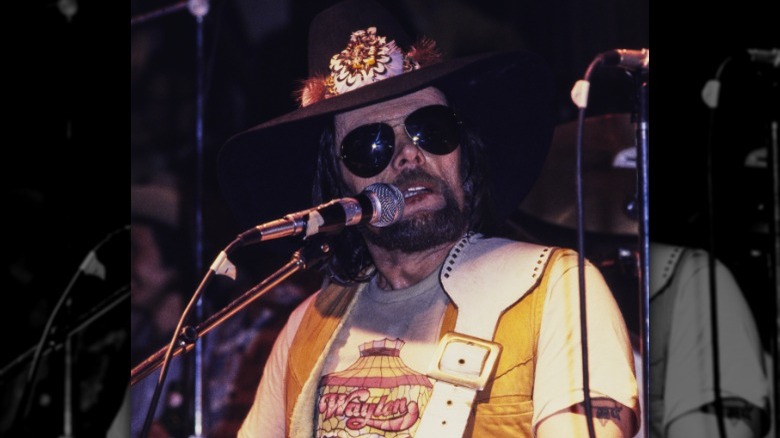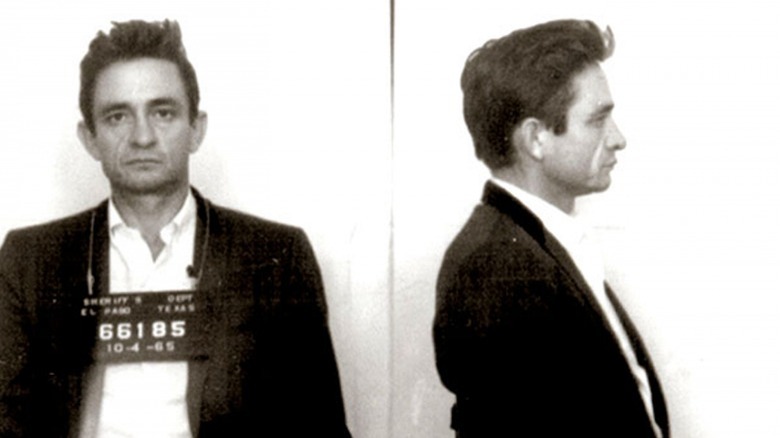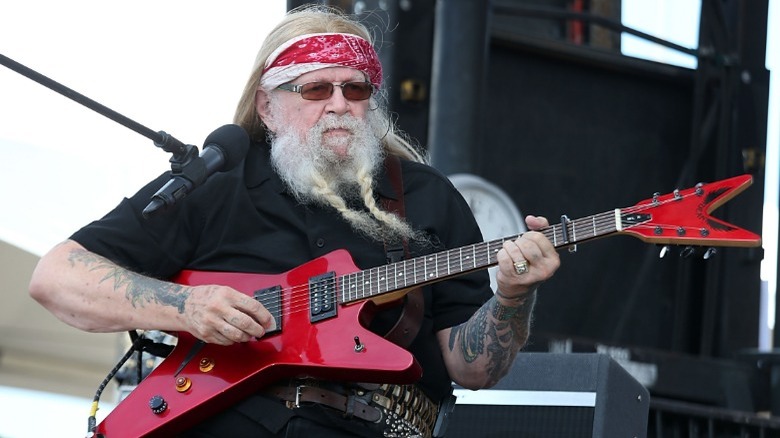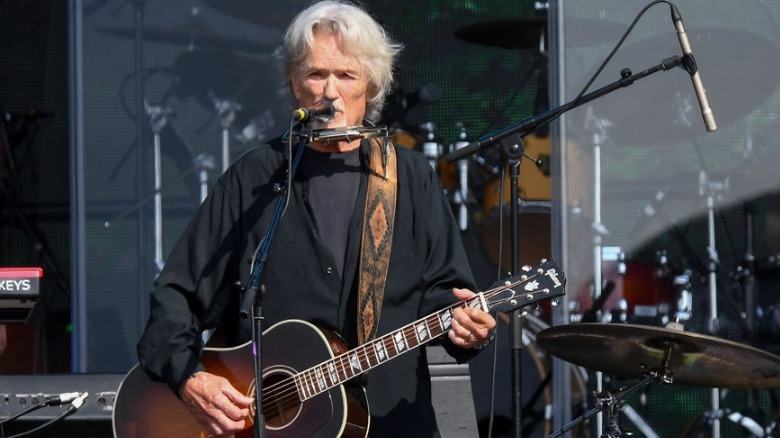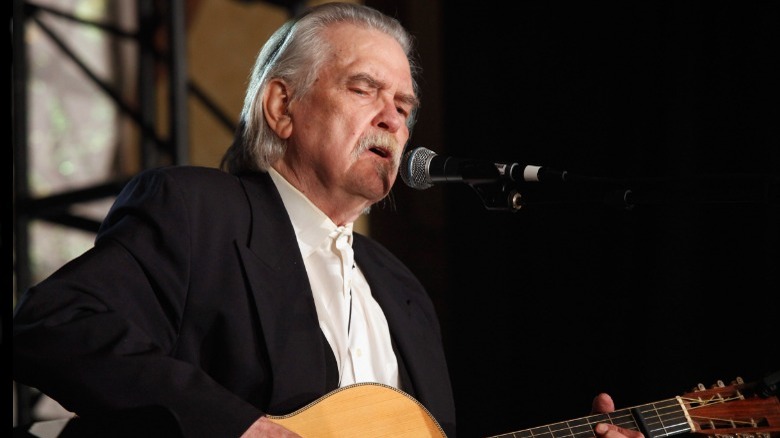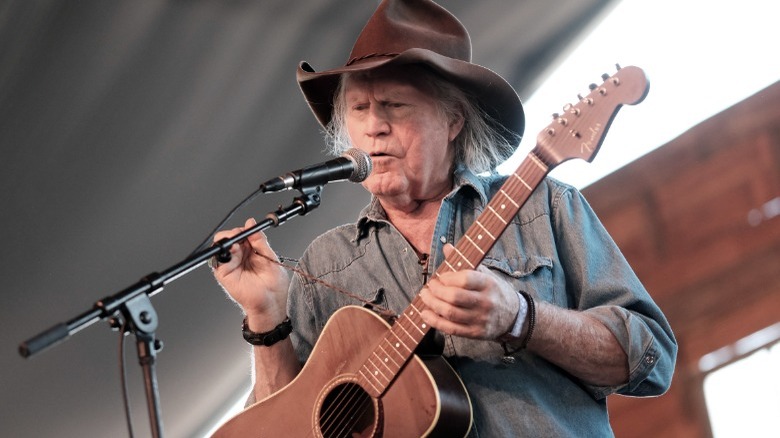The Bad Boys Of Outlaw Country
Though decades past its heyday, the outlaw brand of country music is still alive and well — if you know where to look. While it's no longer topping the charts with songs about hard drinking and rough living, there are still legions of outlaw country fans around the world. Heck, it's still popular enough that there are entire cruise festivals, such as Outlaw Country Cruise, that cater specifically to the outlaw genre. There was also the Outlaw Music Festival Tour in 2022, which featured old legends like Willie Nelson, as well as modern outlaws like Billy Strings.
For most people, the movement is synonymous with country stars Nelson and Waylon Jennings, who are largely responsible for the genre's creation and eventual success (per Britannica). Nowadays, the genre is still led by legends like Nelson and Steve Earle, as well as the new age of country outlaws, headed by young performers like Billy Strings. Defined by its bare-bones sound and incredible honesty, outlaw country is one of the purest forms of American music ever invented. Starting in the 1950s and going through today, these were and are the bad boys of outlaw country.
What makes a country outlaw?
For many people, the first country outlaw artists were Willie Nelson, Waylon Jennings, and Bobby Bare. According to Pitchfork, the "outlaw" name was first coined by Hazel Smith, a country music insider at Tompall Glaser's legendary Hillbilly Central music studio. While most people think that outlaw country refers to a singular type of country music sound, it really describes a lifestyle and attitude more than anything.
For many people, the outlaw country ethos means doing things your own way and fighting against "the man" and society, sometimes with questionable and dubious legality. It's also an internal rebellion against the glitter and pomp of mainstream pop country, instead extolling the virtues of a more simple life, dedicated to personal passions rather than commercialized and manufactured fads.
The genre truly began in the early-1970s, when Bare started to earn the right to dictate what he wanted to play and who wanted to play with. At the same time, Nelson had headed home to Austin, Texas, and he, along with Jennings and Kris Kristofferson, began to popularize the now-famous outlaw country sounds. However, the outlaw country scene was bound to be short-lived, and after a few landmark albums progenitors like Nelson and Jennings moved on to new passages. The spirit of outlaw country still lives on today, but by 1978 the original scene was deteriorating, and by 1979 it was dead.
Jerry Jeff Walker
While he might not have reached the levels of fame that outlaw country companions like Willie Nelson and Waylon Jennings achieved, for many, Jerry Jeff Walker is the true definition of a country outlaw. Though he passed away in 2020 due to cancer, Walker was a constant part of the outlaw country scene from its beginnings in the 1970s (via The New York Times).
He never had a Top 40 hit, but Walker is probably most well known for his song "Mr. Bojangles," which is now considered a country standard. His contributions to the outlaw movement included his album "Viva Terlingua," which featured the Lost Gonzo Band. As The New Yorker explains, he was a huge part of the Texas country music scene and was close with other outlaws like the aforementioned Nelson and Jennings.
He had the perfect voice for outlaw country, far removed from the polished and auto-tuned vocals that are so prevalent today. Walker's voice carried all the grit of an aging Texas cowboy, and you could feel every bit of his lyrics deep in your chest. Known for heavy drinking and a rebellious attitude, Walker was nothing if not a true country outlaw.
Merle Haggard
One of the biggest names in all of country music, Merle Haggard was also a significant contributor to the outlaw country scene. As The New York Times reported in their obituary of him, Haggard drew upon his rough and tumble upbringing as material for his incredibly powerful lyrics. Initially raised in an abandoned train boxcar-turned-house, he was just nine years old when his father died and left him in the care of only his mother.
His adolescent and teenage years were littered with arrests for stealing and other petty crimes, and in 1957 he found himself in San Quentin Prison on burglary charges. It was at San Quentin that he started his writing career, and within a few years, he was out on parole. He truly exemplified the outlaw country ethos and lifestyle, living by the skin of his teeth and breaking the law to make ends meet. Though he would later play alongside him, Haggard was actually still a prisoner when Johnny Cash played his original San Quentin concert in 1959 (via GQ).
Even though he was making music and no longer incarcerated or constantly on the run from the law, Haggard never got rid of his rebellious personality and mindset. He still found himself in jail a few more times during his career, which was also punctuated with five marriages — all of them ending in divorce, but he always made music on his own terms, like a true outlaw.
Willie Nelson
Truly, you cannot tell the story of outlaw country without talking about the true country outlaw himself, Willie Nelson. Though he is widely known for other activities, such as marijuana enthusiasm and occasional acting gigs, Nelson truly made a name for himself by producing some of the first strands of outlaw music in the 1970s (via The New York Times). He had been steadily producing music since the 1960s, but it was when he returned home to Austin, Texas from his residency in Nashville, Tennessee that he began to change his musical direction.
Given artistic freedom in a range he had never experienced before, Nelson began creating outlaw country albums like "Shotgun Willie," "The Red Headed Stranger," and "Wanted! The Outlaws." The new music united strange bedfellows, namely the hippies and the rednecks, two species of Texan who rarely find enough common ground to interact.
But interact they did, and Nelson revived his career by packing clubs with audiences looking to hear his outlaw songs. Though he would soon move on to different styles of country, by the 1980s, his status as an outlaw countryman was forever sealed. Later, he would help from The Highwaymen, a country supergroup that included other outlaws Waylon Jennings, Kris Kristofferson, and Johnny Cash. Working his way through his eighth decade in music, Nelson is still as rebellious as ever, in true outlaw fashion.
Emmylou Harris
While her name might not be the first that comes to mind when you think of outlaw country, Emmylou Harris is definitely an outlaw in her own right. Born in 1947 in Birmingham, Alabama, Harris began performing music while a student at the University of North Carolina (via the Alabama Music Hall of Fame). Though she started out mainly being influenced by the folk and psychedelic movements of the 1960s, in the early 1970s she was introduced to country music, and the arc of her career profoundly changed.
She began putting out records with covers of famous country songs and with collaborations with country music stars. She covered outlaws like Merle Haggard and played with outlaws like Willie Nelson. Musically, she was always willing to be a risk taker, playing the type of music that she wanted, regardless of whether it was always commercially successful — the true ethos of a country outlaw.
In 2022, in light of her outlaw bona fides, she was brought on to be a part of the 6th Outlaw Country Cruise (via Rolling Stone). She is one of the few women to make a name for herself in the outlaw movement, and she is definitely a musical force to be reckoned with.
Steve Earle
Though he was a little later to the scene than some of his outlaw predecessors, Steve Earle still has a serious claim to being one of the top outlaws of all time. He grew up as a teenager in the early-1970s in Texas, the epicenter of the outlaw scene, and it profoundly influenced him. One of his biggest inspirations was outlaw legend Jerry Jeff Walker, who was just beginning his own foray into outlaw country when they first met (via SteveEarle.com).
Another big influence was outlaw Townes Van Zandt, and though they had an at times very tumultuous relationship, his outlaw ethos inspired Earle to eschew commercialization and "commit to making art whether I ever got rich or not." Earle's outlaw lifestyle has included struggles with substance abuse and a stint in prison in the mid-1990s (via The New York Times).
He produced some big outlaw albums, like "Guitar Town" and "Copperhead Road." "Copperhead Road" is one of the true outlaw country anthems of all time, blending rock and country together in a searing ballad about moonshine, marijuana, and a veteran of the Vietnam War. In 2017, he released the song "So You Wanna Be an Outlaw," which featured Willie Nelson, and proved he was still subscribing to the outlaw lifestyle and community.
If you or anyone you know needs help with addiction issues, help is available. Visit the Substance Abuse and Mental Health Services Administration website or contact SAMHSA's National Helpline at 1-800-662-HELP (4357).
Waylon Jennings
Another one of the true country outlaws along with Willie Nelson, you absolutely cannot tell the tale of the outlaw movement without talking about the late Waylon Jennings. As he and Robby Turner explained in "Highwaymen: Friends Till The End" (via PBS), Jennings and Nelson were the true founders and architects of the country outlaw movement. They made the decision to forge their own paths by writing and releasing the kind of music they wanted, without any added fluff or overproducing from the record companies.
Jennings' 1974 album "This Time" was one of the first examples of the country outlaw ethos and lifestyle that shook the country music establishment. Two years later, in 1976, he released "Wanted: The Outlaws" with Nelson and his wife at the time Jessi Colter, which saw incredible commercial success and firmly established the movement as part of the country mainstream (according to The New York Times).
Like other country outlaws, he struggled at times with substance abuse during his career, but he produced an incredible breadth of work. During his career, he was part of five-dozen albums and was responsible for selling over 40 million records, and was part of the supergroup The Highwaymen, which featured pal Nelson, as well as fellow outlaws Johnny Cash and Kris Kristofferson. He died a premature death in 2002 at the age of 64 due to natural causes, but will always be remembered as the true country outlaw.
Johnny Paycheck
A country outlaw before there was outlaw country, Johnny Paycheck exemplified the movement as an elder statesman. As The New York Times explains, Paycheck penned ballads in the 1960s that were about a decade early for the outlaw movement. He drew upon his hard-edged lifestyle, which included numerous prison escapes as well as a short prison bid in the 1950s for an assault charge, for his lyrics. With friends like Hell's Angels' Sonny Barger, Paycheck became an outlaw spokesman for a generation of country fans.
Though his 1977 cover of fellow outlaw David Allan Coe's "Take This Job and Shove it" was massively successful, it was covering up personal and legal problems that were soon to bubble to the surface. In 1973, he ran into problems with check forgery, and in 1981 he faced charges related to the sexual assault of a minor, which led to his ouster from the mainstream country scene. Four years later, in 1985, he again found himself in legal jeopardy after shooting a man in the head.
He ended up serving two years in prison before his sentence was commuted, but it largely ended his outlaw days. Paycheck gave up his outlaw lifestyle and turned to religion while incarcerated. He died in 2003 at the age of 64 from respiratory failure.
If you or anyone you know has been a victim of sexual assault, help is available. Visit the Rape, Abuse & Incest National Network website or contact RAINN's National Helpline at 1-800-656-HOPE (4673).
Johnny Cash
Considering he was one of the most important and consistent parts of the American country music scene for several decades, it's of little surprise that Johnny Cash was also a big part of the outlaw country movement and another of its elder statesmen. One of his earliest songs, "Folsom Prison Blues" from 1954, described the life of an incarcerated outlaw and was an early look at what the genre would eventually morph into a few decades later (via The New York Times). His nickname was "The Man in Black," and his mysterious and gruff demeanor put him right at home with other outlaw greats.
He is credited with helping to popularize the outlaw movement, using his stature to make it acceptable to those in the Nashville establishment. In the 1980s, Cash joined up with other outlaws Willie Nelson, Waylon Jennings, and Kris Kristofferson to form the outlaw supergroup The Highwaymen.
In the late-1960s, just before the outlaw movement kicked off, Cash was putting out his live albums from the Folsom and San Quentin prisons, and though he wasn't putting out outlaw albums at the height of the movement, his persona and image have always been that of a country outlaw. Cash died in 2003 at the age of 71 of natural causes.
David Allan Coe
David Allan Coe is one of the most controversial stars of the outlaw country movement. As AllMusic explains, Coe was born in 1939 and began producing country music in the 1960s. Already embracing the outlaw lifestyle, Coe had previously served multiple prison sentences over the preceding two decades. He combined blues, R&B, and country music together in a very popular hybrid that quickly put him on the country map.
He collaborated with other outlaws like Willie Nelson, Waylon Jennings, and Johnny Paycheck, and his outlaw image was always front and center at all times. But beginning in the 1980s, Coe began to run afoul of many critics who accused him of racism and misogyny over his 1982 album "Underground Album."
In 2000, he was the subject of an article in The New York Times that called the material "some of the most racist, misogynist, homophobic, and obscene songs" in music history. He has denied the accusations of racism, including during an interview with Michael Buffalo Smith in 2004 (via Swampland), during which he defended himself as a songwriter, but which was itself problematic for his consistent use of racially charged terms. As of early 2023 Coe was still producing music, and venturing out into rock and roll with various collaborations.
Kris Kristofferson
Kris Kristofferson is another one of the biggest names in outlaw country. Born in 1936 in Texas, the home of outlaw country, Kristofferson is the rare outlaw to have pursued both a Rhodes Scholarship and master's degree before starting his country career (via Britannica). His big break was at the 1969 Newport Folk Festival, which happened just after his introduction to fellow outlaw Johnny Cash. He was one of the earliest performers in the outlaw country genre (via Pitchfork).
By the mid-1970s, Kristofferson not only had a burgeoning music career but was also becoming an accomplished actor. In 1973, he starred in "Pat Garrett and Billy the Kid," playing the title character of Billy — a real-life outlaw. He won a Grammy in 1971 and soon became a part of the outlaw country movement. In the 1980s, he formed The Highwaymen with Cash, Willie Nelson, and Waylon Jennings. In recognition of his talent, he has been inducted into the Songwriter Hall of Fame and was given a Grammy Lifetime Achievement award.
Not your typical outlaw, Kristofferson did not have documented struggles with substance abuse or misogyny, and never found himself on the wrong end of the law dealing with lengthy jail or prison stints. He was actually an Army Ranger in the 1960s, marking him as a truly unique, but thoroughly patriotic and American, country outlaw.
Guy Clark
On May 17, 2016, the world lost a true country outlaw when Guy Clark passed away from natural causes (as reported by The New York Times). Clark was a close collaborator of outlaws like Jerry Jeff Walker, and other outlaws like Willie Nelson, Johnny Cash, and Emmylou Harris all covered his material. He was a Texas musician, which gave him a strong familiarity with the movement from its beginnings.
Though he wasn't the most commercially successful of outlaws, he always embraced the outlaw spirit of hard work and being as authentic and true as possible. His biggest hit was undoubtedly "L.A. Freeway," which was released in 1973. "L.A. Freeway" is about the hard life of living on the road and trying to provide for your family, and trying to survive "without getting killed or caught" (via Rolling Stone). It very much exemplifies the outlaw country ethos and lifestyle and endeared Clark to outlaw fans everywhere. Clark passed away at the age of 74, due to natural causes.
Billy Joe Shaver
Billy Joe Shaver never got the respect or name recognition as outlaws like Willie Nelson and Waylon Jennings, but he was still every bit responsible for creating and nurturing the movement during its early years (according to The New York Times). In addition to writing songs for outlaws, Shaver also recorded his own music, and first became popular after appearing on Jennings' 1973 album "Honky Tonk Heroes." He helped Jennings write nearly all of the songs, and his first album was produced by outlaw Kris Kristofferson.
Another native of Texas, Shaver started trying his hand at being a professional musician in the 1960s but didn't see success until the outlaw movement kicked off in the early-1970s. He suffered personal struggles, including the deaths of his wife and daughter, and in 2004 was the subject of a documentary, "The Portrait of Billy Joe."
Shaver died in 2020 at the age of 81 due to natural causes. He passed away less than a week after fellow outlaw Jerry Jeff Walker, in Waco, Texas, near his original home of Corsicana.
